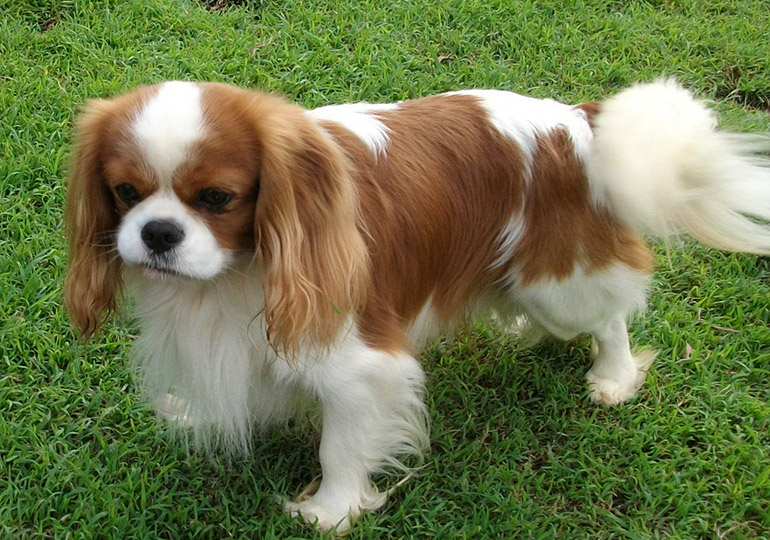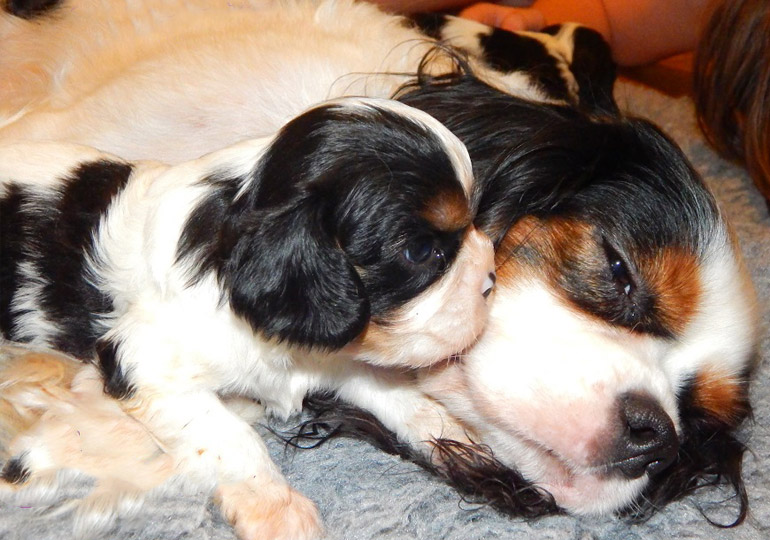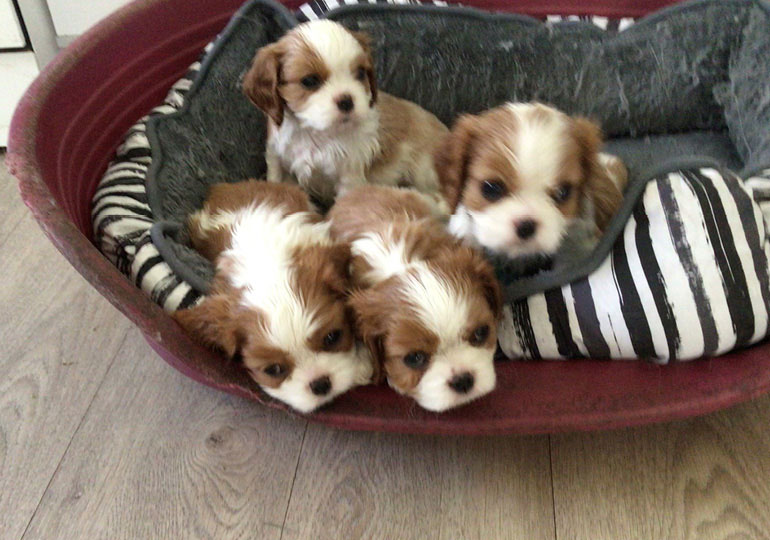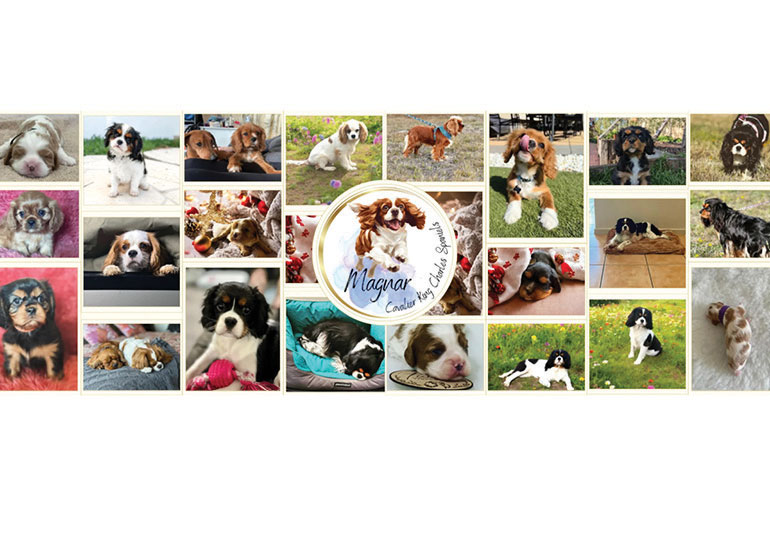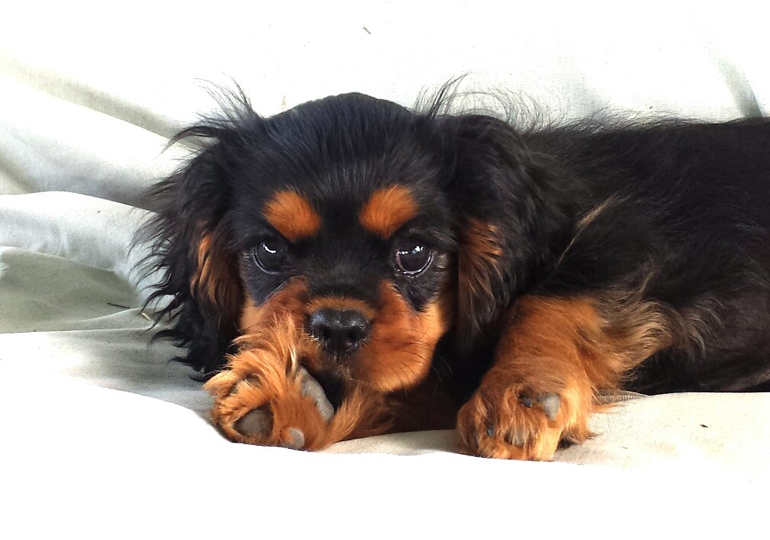Breeds
Cavalier King Charles Spaniel
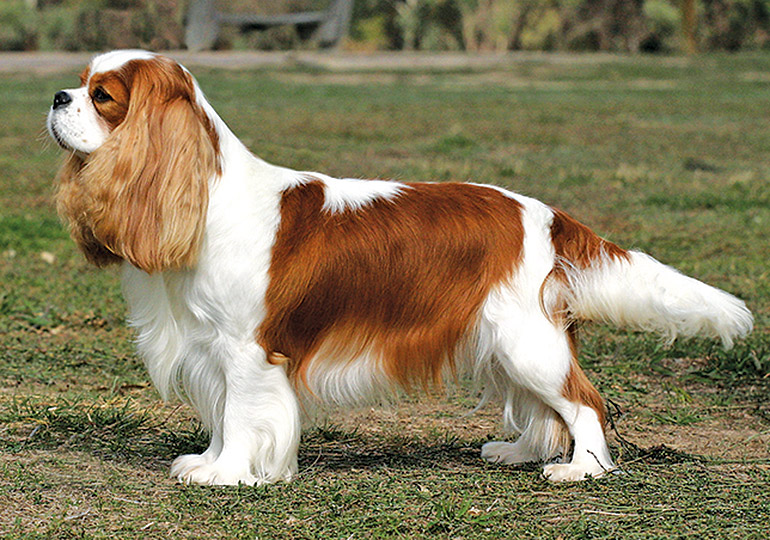
GROUP 1 - TOYS
History
The Cavalier King Charles Spaniel of today is the direct descendant of the small Toy Spaniels, seen in so many of the pictures of the 16th, 17th and 18th centuries. It was under the Stuarts, that they were given the royal title of King Charles Spaniels. History tells us that King Charles II was seldom seen without two, three or more at his heels.
In the 18th and 19th centuries, a special strain of red and white Toy Spaniels was bred at Blenheim Palace, by the Dukes of Marlborough. This strain became well known for their sporting qualities, as well as their claims as ladies’ companions.
In Queen Victoria’s reign, breeders started to hold shows, which introduced a new fashion for the breed: dogs with a shorter face. The gradual evolution of the flat face of the King Charles Spaniel is still popular today and has created a very lovely breed.
At the same time, Mr Roswell Eldridge, an American and a great lover of Toy Spaniels, came over to England and was disappointed to find that there were none of the little nosey spaniels left. He immediately set about trying to right this by offering prizes at Crufts for dogs of the same variety seen in King Charles II’s time. The King Charles breeders did not take these classes very seriously, as they had worked hard for years to do away with the long nose, so it was hardly a popular move. Gradually, as the big prizes came to an end, only a few enthusiasts were left to carry on the breeding experiment.
In 1928 a club was founded, and the title “Cavalier King Charles Spaniel” was chosen. The standard of the breed was drawn up, which is practically the same as it is today. The breed was granted separate registration by the English Kennel Club in 1946 and today is one of the most popular companion dogs.
Appearance
The Cavalier King Charles Spaniel is active, graceful and well balanced with a gentle expression, weighing between (5.4 - 8.1 kg), with a slight variation permissible.
The coat is long, silky and free from curl, though a slight wave is permissible. Feathering on ears, legs and tail should be long, with the feathering on the feet a feature of the breed.
No trimming or artificial colouring of the dog is permitted. The Cavalier comes in four colour varieties: Blenheim (red and white markings), Black and Tan (Black with tan markings over the eyes, inside ears and under the tail), Tri-Coloured (black and white with tan markings) and Ruby (all over rich red).
Temperament
Known in some circles as the Royal Spaniel, the Comforter Spaniel, or the Spaniel Gentle, the Cavalier King Charles Spaniel is truly among the nobility of toy dogs, with his limpid eyes, quiet dignity and love of all things great and small.
Typically the Cavalier is fearless and sporting in nature, yet at the same time, gentle and affectionate. A Cavalier does not do well in a kennel, nor is he an outside dog, being happiest as a member of the family, joining in family activities.
Health
Cavaliers are generally a happy, healthy breed of dog. However, as with many other breeds, there may be genetic health concerns within the breed. It is possible to use DNA testing to screen for some of these conditions, but DNA tests are not available for the major health concerns at this time. A great deal of research is being done internationally to investigate the causes.
There are two, main, health concerns for Cavaliers: MVD or Mitral Valve Disease which affects the heart and CM/SM or Syringomyelia - a neurological problem. Both of these conditions are progressive, meaning that dogs may only develop the problem or symptoms, if any, later in life.
It should be stressed that not all Cavaliers will be affected by either of these conditions. The vast majority of Cavaliers are generally happy, healthy dogs, many leading long and happy lives, living well into their “teens”.
The Cavalier King Charles Spaniel Club of NSW encourages health testing by its members and organises health clinics during the year to enable breeders to get their breeding stock tested on a regular basis and invites veterinary specialists to club meetings, to give presentations on all health aspects of breeding Cavaliers. These are conditions which reputable breeders are aware of, and those intending to purchase a puppy are recommended to buy from breeders who are prepared to discuss and advise on these concerns.
The Cavalier King Charles Spaniel has always been considered a natural breed and enthusiasts have tried to keep it that way. This has helped the Cavalier to remain an unexaggerated breed of dog.
Suitability
Children and Cavaliers are great friends and supporters of each other. In fact, the Cavalier will suit a person of any age, from 1 to 100 years, as they are adaptable to both active, family life and as companions to older and less active members of the community.
Article supplied by the Cavalier King Charles Spaniel Club of NSW
Image: Michael Trafford Photography
In Conclusion
Now you know a little about the Cavalier King Charles Spaniel, you may think that this is the dog for you. Before you make a decision, please make contact with the breed club or your State controlling body for purebred dogs. They will be able to give you information about available puppies and also suggest dog shows where you can see the breed and speak to breeders. In this way you will gain a better perspective of the Cavalier King Charles Spaniel and its needs, and whether this breed would suit your lifestyle.
Breeders

